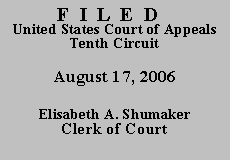

| ALBERT L. BOSCH,
v.
DAVID R. MCKUNE, Warden,
Lansing Correctional Facility; PHIL
KLINE, Kansas Attorney General |
|
On June 17, 1998, Mr. Bosch broke into, and entered, the screened porch and attached garage of Sharon McDaniels. He stole her weed-eater and an air compressor, and drove away. As he was leaving, Ms. McDaniels informed her fiancé of the theft, and he called the police. Officer Bohlender of the Tulsa Police Department, driving to work in plain clothes, heard the police dispatch regarding the robbery. Despite the fact that the location was beyond his jurisdiction, he was nearby and drove to the scene. As he arrived, he observed a vehicle driving away. He followed the speeding vehicle for some time, and when he caught up he placed a portable "Kojak" emergency light atop his vehicle and pulled the suspect over.
After he stopped his vehicle, the suspect backed into the officer's vehicle. The suspect then fled, with the officer in pursuit. The officer testified that the suspect's vehicle came at him several times, with the officer discharging his weapon in an attempt to stop it. Later, police found the suspect's vehicle and connected it to Mr. Bosch. Ms. McDaniels also identified Mr. Bosch as the thief.
Mr. Bosch was convicted by a jury in Kansas state court of attempted second-degree murder, aggravated burglary, aggravated battery, three counts of criminal damage, and reckless driving, and was sentenced to 776 months imprisonment. He appealed, and his conviction was affirmed by the state court of appeals, and the state supreme court denied review. Mr. Bosch also filed a state habeas petition, the state district court denied it, the denial was affirmed by the state court of appeals, and the state supreme court denied review.
On appeal from the denial of his federal habeas petition, Mr. Bosch raises seven arguments: (1) his Sixth and Fourteenth Amendment rights were violated when the trial court failed to instruct the jury on his requested aggravated battery instructions as a lesser included offense of first degree attempted murder; (2) his Sixth and Fourteenth Amendment rights were violated by the manner in which the court responded to a jury query; (3) insufficient evidence supports his conviction for attempted murder; (4) he was denied his "constitutionally protected right to present his defense" because the police department destroyed his vehicle, which he contends contained exculpatory evidence; (5) his sentence is constitutionally impermissible and shocks the conscience; (6) he received ineffective assistance of trial counsel by (a) not calling certain witnesses and introducing certain evidence, (b) persuading Mr. Bosch not to testify, (c) failing to file a motion in limine concerning the officer's legal status, (d) having a conflict of interest with Mr. Bosch due to mental disability, (e) failing to object to jury instruction number 26, (f) imposing a guilt-based defense, (f) failing to object to a selective and discriminatory prosecution; (7) he received ineffective assistance of appellate counsel; and (8) the federal district court failed to consider newly found evidence.
In order for this court to grant a COA, Mr. Bosch must make "a substantial showing of the denial of a constitutional right." 28 U.S.C. § 2253(c)(2). Where the district court has rejected Mr. Bosch's constitutional claims on the merits, he must demonstrate that "reasonable jurists would find the district court's assessment of the constitutional claims debatable or wrong." Slack v. McDaniel, 529 U.S. 473, 484 (2000). Where the district court has rejected Mr. Bosch's constitutional claims on procedural grounds, he must demonstrate that "jurists of reason would find it debatable whether the petition states a valid claim of the denial of a constitutional right and that jurists of reason would find it debatable whether the district court was correct in its procedural ruling." Id.
With regards to those claims presented to the Kansas state courts (either on direct appeal or on post-conviction appeal) and were denied, the district court could not properly issue a writ of habeas corpus unless it found that the state court adjudication resulted in a decision that "was contrary to, or involved an unreasonable application of, clearly established Federal law, as determined by the Supreme Court of the United States." 28 U.S.C. § 2254(d)(1); Williams v. Taylor, 529 U.S. 362, 412-13 (2000). It is against these standards that we assess the district court's denial of Mr. Bosch's federal petition.
Having carefully reviewed the district court's analysis of Mr. Bosch's claims on appeal, as well as the record proper, we conclude that our standard of review precludes us from arriving at a conclusion at variance with the conclusion of the district court. On those claims implicating federal constitutional rights, we are persuaded that the state courts' conclusions were not contrary to and did not involve an unreasonable application of clearly established federal law. 28 U.S.C. § 2254(d)(1). The district court addressed Mr. Bosch's claims, and we do not find that "reasonable jurists would find the district court's assessment of the constitutional claims debatable or wrong." Slack, 529 U.S. at 484. Accordingly, we conclude that none of Mr. Bosch's claims suffice to make a substantial showing of a denial of a constitutional right. Suffice it to say that the claim of newly found evidence does not involve material evidence. Accordingly, for substantially the reasons given by the district court, we DENY a COA and DISMISS the appeal.
All pending motions are DENIED.
Entered for the Court
Paul J. Kelly, Jr.
Circuit Judge